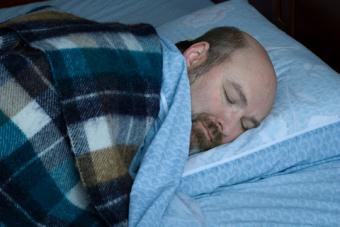
Dr. Joseph Ojile discusses the effects of sleep on the cardiovascular system in this LoveToKnow interview. The effects begin at the onset of falling asleep and continue through the five stages of sleep. Sleep apnea can negatively affect the cardiovascular system, leading to health problems if left untreated.
About Dr. Joseph Ojile
Dr. Joseph Ojile is an expert on sleep and the cardiovascular system. He founded the Clayton Sleep Institute, where he serves as CEO, and he is the managing director of Saint Louis Sleep Clinic. Dr. Ojile founded Midwest Updates in Sleep Medicine, a national continuing medical education (CME) program and he an associate professor for the Department of Internal Medicine Division of Pulmonary Medicine at Saint Louis University. He is the Medical Director of Sleep Services at St. Anthony's Medical Center.
Dr. Ojile is very active in a number of professional organizations including:
- Academy of Sleep Medicine
- American College of Chest Physicians
- American Society of Internal Medicine
- St. Louis Metropolitan Medical Society
- American Thoracic Society
He is certified by:
- National Board of Medical Examiners
- American Board of Internal Medicine
- American Board of Sleep Medicine
- American Board of Pulmonary Diseases
Dr. Ojile has taken time out of his remarkably busy schedule to answer questions about the effects of sleep on the cardiovascular system.
Interview with Dr. Ojile: Effects of Sleep on the Cardiovascular System
Stages of Sleep
LoveToKnow (LTK): How does the onset of sleep affect the cardiovascular system?Dr. Joseph Ojile (JO): Sleep should generally be a 'restful' time for the cardiovascular system with reductions in both blood pressure and heart rate as well as catecholamines. Catecholamines are frequently called our 'fight or flight' hormones.
LTK: What changes occur during transitions between NonREM and REM sleep?
JO: The transitions from NonREM to REM are transitions to a more active brain and physiologic state. During this time there is muscle paralysis with the exception of the breathing and eye muscles. We know people are in REM because they have specific eye movements which we monitor while their other muscles are paralyzed. Theoretically, one of the reasons for the muscle paralysis is so folks do not 'act out' their dreams. Up to 85 percent of dreams occur during REM sleep.
LTK: How does REM sleep affect the circulatory system?
JO: REM sleep is the most physiologically active--the brain appears the same as when awake and the body's cardiovascular system shows the most activity.
Sleep Related Breathing Disorders
LTK: Many people suffer from sleep related breathing problems. Is there a relationship between cardiovascular disease and obstructive sleep apnea? JO: One of the reasons that obstructive sleep apnea is so injurious to the circulatory system is that, instead of seeing the reduction in heart rate, blood pressure and catecholamines, there is a 'sawtooth' acceleration of all these parameters with marked stress on the cardiovascular system. This is thought to contribute to the increase in hypertension, heart disease and stroke in obstructive sleep apnea patients.
LTK: The causes of central sleep apnea differ from obstructive sleep apnea. How does central sleep apnea affect the cardiovascular system?
JO: Central sleep apnea is seen at higher altitudes (going to the mountains from Saint Louis), with heart disease (frequently with congestive heart failure), and neurologic injury (stroke, for example). It can portend a risk for long term illness in some patients, but this is less clear.
Medication and Alcohol
LTK: Many different factors can interfere with the ability to sleep well. Do medications and alcohol affect the cardiovascular system during sleep?JO: Medications, depending on their chemical properties, can certainly affect sleep. Alcohol is very disruptive to sleep. It is initially sedating; but, after approximately four hours, it becomes irritating to the brain and disrupts sleep. In addition, to continue the sedative affects, the dose of alcohol must usually be increased resulting in increasing use of alcohol.
Special thanks to Dr. Joseph Ojile for answering questions about sleep and the cardiovascular system. Learn more by visiting the Clayton Sleep Institute website where you will find articles, information about sleep studies and a sleeping quiz.







